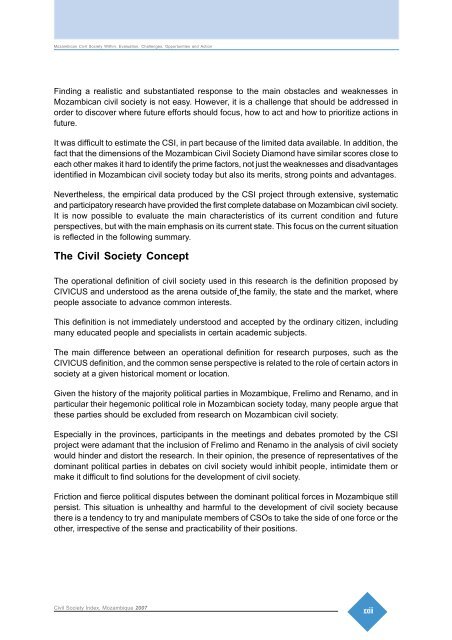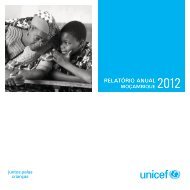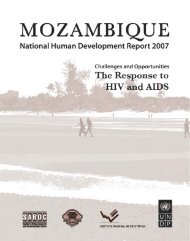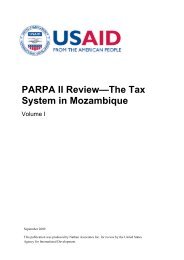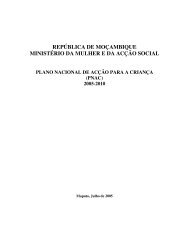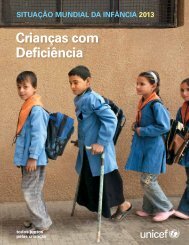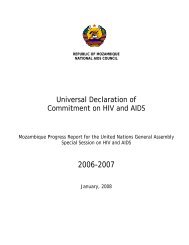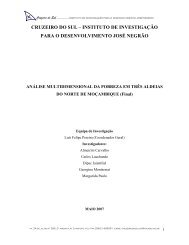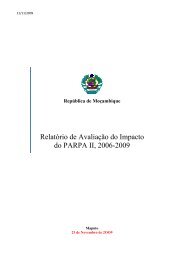Mozambican Civil Society Within: - UNICEF Mozambique - Home page
Mozambican Civil Society Within: - UNICEF Mozambique - Home page
Mozambican Civil Society Within: - UNICEF Mozambique - Home page
Create successful ePaper yourself
Turn your PDF publications into a flip-book with our unique Google optimized e-Paper software.
<strong>Mozambican</strong> <strong>Civil</strong> <strong>Society</strong> <strong>Within</strong>: Evaluation, Challenges, Opportunities and Action<br />
Finding a realistic and substantiated response to the main obstacles and weaknesses in<br />
<strong>Mozambican</strong> civil society is not easy. However, it is a challenge that should be addressed in<br />
order to discover where future efforts should focus, how to act and how to prioritize actions in<br />
future.<br />
It was difficult to estimate the CSI, in part because of the limited data available. In addition, the<br />
fact that the dimensions of the <strong>Mozambican</strong> <strong>Civil</strong> <strong>Society</strong> Diamond have similar scores close to<br />
each other makes it hard to identify the prime factors, not just the weaknesses and disadvantages<br />
identified in <strong>Mozambican</strong> civil society today but also its merits, strong points and advantages.<br />
Nevertheless, the empirical data produced by the CSI project through extensive, systematic<br />
and participatory research have provided the first complete database on <strong>Mozambican</strong> civil society.<br />
It is now possible to evaluate the main characteristics of its current condition and future<br />
perspectives, but with the main emphasis on its current state. This focus on the current situation<br />
is reflected in the following summary.<br />
The <strong>Civil</strong> <strong>Society</strong> Concept<br />
The operational definition of civil society used in this research is the definition proposed by<br />
CIVICUS and understood as the arena outside of the family, the state and the market, where<br />
people associate to advance common interests.<br />
This definition is not immediately understood and accepted by the ordinary citizen, including<br />
many educated people and specialists in certain academic subjects.<br />
The main difference between an operational definition for research purposes, such as the<br />
CIVICUS definition, and the common sense perspective is related to the role of certain actors in<br />
society at a given historical moment or location.<br />
Given the history of the majority political parties in <strong>Mozambique</strong>, Frelimo and Renamo, and in<br />
particular their hegemonic political role in <strong>Mozambican</strong> society today, many people argue that<br />
these parties should be excluded from research on <strong>Mozambican</strong> civil society.<br />
Especially in the provinces, participants in the meetings and debates promoted by the CSI<br />
project were adamant that the inclusion of Frelimo and Renamo in the analysis of civil society<br />
would hinder and distort the research. In their opinion, the presence of representatives of the<br />
dominant political parties in debates on civil society would inhibit people, intimidate them or<br />
make it difficult to find solutions for the development of civil society.<br />
Friction and fierce political disputes between the dominant political forces in <strong>Mozambique</strong> still<br />
persist. This situation is unhealthy and harmful to the development of civil society because<br />
there is a tendency to try and manipulate members of CSOs to take the side of one force or the<br />
other, irrespective of the sense and practicability of their positions.<br />
<strong>Civil</strong> <strong>Society</strong> Index, <strong>Mozambique</strong> 2007<br />
xxiii


